Related Research Articles
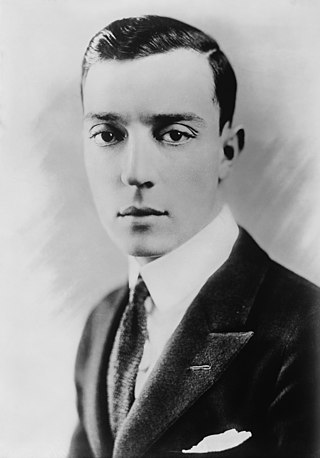
Joseph Frank "Buster" Keaton was an American actor, comedian and filmmaker. He is best known for his silent films during the 1920s, in which he performed physical comedy and inventive stunts. He frequently maintained a stoic, deadpan facial expression that became his trademark and earned him the nickname "The Great Stone Face".

Edward Francis Cline was an American screenwriter, actor, writer and director best known for his work with comedians W.C. Fields and Buster Keaton. He was born in Kenosha, Wisconsin and died in Hollywood, California.

Convict 13 is a 1920 two-reel silent comedy film starring Buster Keaton. It was written and directed by Keaton and Edward F. Cline.

Neighbors is a 1920 two-reel silent comedy film co-written, co-directed by, and starring Buster Keaton.

The Goat is a 1921 American two-reel silent comedy film written, and co-directed by Malcolm St. Clair and Buster Keaton and starring Keaton.
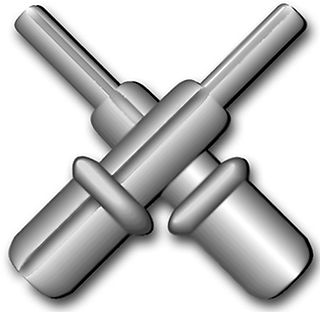
The United States Navy and United States Coast Guard occupational rating of gunner's mate (GM) is a designation given by the Bureau of Naval Personnel (BUPERS) to enlisted sailors who either satisfactorily complete initial Gunner's Mate "A" school training, or who "strike" for the rating by showing competence in the field of ordnance. When "striking" one isn't required to be a seaman, but must belong to one of three undesignated rates: Fireman (FN), Seaman (SN), or Airman (AN). It is also possible to cross rate to Gunner's Mate. Cross rating refers to the act of an enlisted sailor "crossing" from their current rating to another rating of their choice, provided their ASVAB scores are high enough and there are open slots for the rate.

The Garage is a 1920 American two-reel silent comedy film directed by and starring Roscoe "Fatty" Arbuckle and featuring Buster Keaton. This was the fourteenth and last film starring the duo before Keaton set up his own studio and Arbuckle started making feature-length films. The film also stars Luke the Dog, who starred in many other short comedies with Arbuckle. The film was also known as Fire Chief.
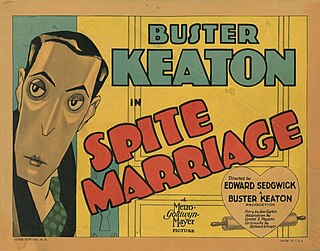
Spite Marriage is a 1929 American silent comedy film co-directed by Buster Keaton and Edward Sedgwick and starring Keaton and Dorothy Sebastian. It is the second film Keaton made for MGM and his last silent film, although he had wanted it to be a "talkie" or full sound film. While the production has no recorded dialogue, it does feature an accompanying synchronized score and recorded laughter, applause and other sound effects in some scenes. Keaton later wrote gags for some up-and-coming MGM stars like Red Skelton, and from this film recycled many gags, some shot-for-shot, for Skelton's 1943 film I Dood It.

Love Nest on Wheels is a 1937 Educational Pictures short subject directed by Buster Keaton and Charles Lamont. The film borrows heavily from Keaton's 1918 film The Bell Boy.

Allez Oop is a 1934 American short comedy film starring Buster Keaton. It was the second film Keaton made for Educational Pictures.
One Run Elmer is a 1935 American short comedy film featuring Buster Keaton, and directed by Charles Lamont.
Hayseed Romance is a 1935 American short comedy film featuring Buster Keaton.
The E-Flat Man is a 1935 American short comedy film featuring Buster Keaton.
Three on a Limb is a 1936 American short comedy film directed by Charles Lamont and starring Buster Keaton.
Blue Blazes is a 1936 American short comedy film directed by Raymond Kane and starring Buster Keaton.
The Chemist is a 1936 American short comedy film featuring Buster Keaton.
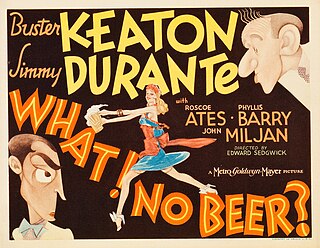
What! No Beer? is a 1933 Pre-Code comedy film released by Metro-Goldwyn-Mayer directed by Edward Sedgwick and starring Buster Keaton and Jimmy Durante. MGM had also paired Keaton and Durante as a comedy team during this period in The Passionate Plumber and Speak Easily.
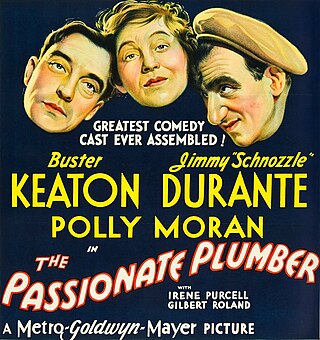
The Passionate Plumber is a 1932 American pre-Code comedy film directed by Edward Sedgwick, and starring Buster Keaton, Jimmy Durante, and Irene Purcell. The screenplay by Laurence E. Johnson and Ralph Spence is based on the 1926 play Dans sa candeur naïve by Jacques Deval. It is the second screen adaptation of the play, following the 1928 silent film The Cardboard Lover. It later was remade in 1942 as Her Cardboard Lover.

The Buster Keaton Story is a 1957 American biographical drama film directed by Sidney Sheldon and written by Sidney Sheldon and Robert Smith, following the life of Buster Keaton. The film stars Donald O'Connor, Ann Blyth, Rhonda Fleming, Peter Lorre, Larry Keating and Jackie Coogan. It was released on April 21, 1957, by Paramount Pictures. The film was described by AllMovie as "sublimely inaccurate" regarding details of Keaton's life. It was produced by Paramount Pictures, which paid Keaton $50,000 for the rights to his life story.

Doughboys is a 1930 American Pre-Code comedy film starring Buster Keaton. It was Keaton's second starring talkie vehicle and has been called Keaton's "most successful sound Picture." A Spanish-language version was also made under the title, De Frente, Marchen.
References
- ↑ "Keaton's Films". busterkeaton.com. Retrieved February 16, 2012.